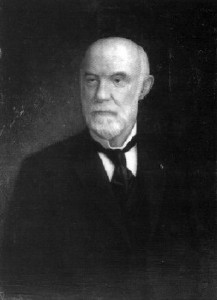Walter Evans (American politician)
| Walter Evans | |
|---|---|

Portrait of Evans by Aurelius O. Revenaugh (1906)
|
|
| Justice of the United States District Court for the Western District of Kentucky | |
| In office July 1, 1901 – December 30, 1923 |
|
| Nominated by | William McKinley |
| Preceded by | New district |
| Succeeded by | Charles I. Dawson |
| Justice of the United States District Court for the District of Kentucky | |
| In office March 3, 1899 – June 30, 1901 |
|
| Nominated by | William McKinley |
| Preceded by | John Watson Barr |
| Succeeded by | District divided |
| Member of the U.S. House of Representatives from Kentucky's 5th district |
|
| In office March 4, 1895 – March 3, 1899 |
|
| Preceded by | Asher G. Caruth |
| Succeeded by | Oscar Turner |
| 14th Commissioner of Internal Revenue | |
| In office May 21, 1883 – March 19, 1885 |
|
| President | Chester A. Arthur |
| Succeeded by | Joseph S. Miller |
| Personal details | |
| Born | September 18, 1842 Barren County, Kentucky |
| Died | Script error: The function "death_date_and_age" does not exist. Louisville, Kentucky |
| Resting place | Cave Hill Cemetery |
| Political party | Republican |
| Relations | Nephew of Burwell Clark Ritter |
| Profession | Lawyer |
| Military service | |
| Allegiance | Union |
| Service/branch | Union Army |
| Years of service | 1861 – 1863 |
| Rank | Second Lieutenant |
Walter Evans (September 18, 1842 – December 30, 1923) was a U.S. Representative from Kentucky, nephew of Burwell Clark Ritter.
Contents
Early life
Born near Glasgow, Kentucky, Evans attended the public schools near Harrodsburg, Kentucky. He moved to Hopkinsville, Christian County, where he served as deputy county clerk in 1859. He was a captain in the Union Army 1861-1863. He served as deputy and later as chief clerk of the circuit court.
Political career
Early career
Evans read law and was admitted to the bar in 1864. He commenced practice in Hopkinsville, and served as delegate to the Republican National Conventions in 1868, 1872, 1880, and 1884. Evans was elected to the Kentucky House of Representatives in 1871 and to the Kentucky Senate in 1873. He moved to Louisville, Kentucky in 1874, where he continued the practice of law. He was an unsuccessful candidate for election in 1876 to the Forty-fifth Congress. He was the Republican nominee for Governor of Kentucky in 1879, but lost to Luke P. Blackburn. He was appointed by President Chester A. Arthur as Commissioner of Internal Revenue on May 21, 1883, and served until April 20, 1885, when he returned to Louisville and resumed the practice of law.
Congressional career
Evans was elected as a Republican to the Fifty-fourth and Fifty-fifth Congresses (March 4, 1895 – March 3, 1899). He was an unsuccessful candidate for reelection in 1898 to the Fifty-sixth Congress.
Judgeship
Evans was nominated by President William McKinley on March 3, 1899, to a seat on the United States District Court for the District of Kentucky vacated by John W. Barr. He was confirmed by the United States Senate on March 3, 1899, and received commission the same day. Evans's service was terminated on July 1, 1901, due to reassignment to another court. On July 1, 1901 Evans was reassigned to the United States District Court for the Western District of Kentucky. He served in this capacity until his death at his home in Louisville, Kentucky, December 30, 1923. He was interred in Cave Hill Cemetery.
References
- Walter Evans at the Biographical Directory of the United States Congress
- Walter Evans at the Biographical Directory of Federal Judges, a public domain publication of the Federal Judicial Center.
External links
- Lua error in package.lua at line 80: module 'strict' not found.
![]() This article incorporates public domain material from websites or documents of the Biographical Directory of the United States Congress.
This article incorporates public domain material from websites or documents of the Biographical Directory of the United States Congress.
| United States House of Representatives | ||
|---|---|---|
| Preceded by | Member of the U.S. House of Representatives from Kentucky's 5th congressional district March 4, 1895 – March 3, 1899 |
Succeeded by Oscar Turner |
| Legal offices | ||
| Preceded by | Judge of the United States District Court for the District of Kentucky 1899–1901 |
Succeeded by seat abolished |
Lua error in package.lua at line 80: module 'strict' not found.
- Wikipedia articles incorporating text from the Biographical Directory of Federal Judges
- Wikipedia articles incorporating text from the Biographical Directory of the United States Congress
- 1842 births
- 1923 deaths
- Kentucky Republicans
- Kentucky lawyers
- Union Army officers
- People of Kentucky in the American Civil War
- Members of the United States House of Representatives from Kentucky
- Judges of the United States District Court for the District of Kentucky
- Commissioners of Internal Revenue
- Burials at Cave Hill Cemetery
- United States federal judges appointed by William McKinley
- Judges of the United States District Court for the Western District of Kentucky
- People from Barren County, Kentucky
- Kentucky gubernatorial candidates
- Members of the Kentucky House of Representatives
- Kentucky State Senators
- Republican Party members of the United States House of Representatives
- Politicians from Louisville, Kentucky